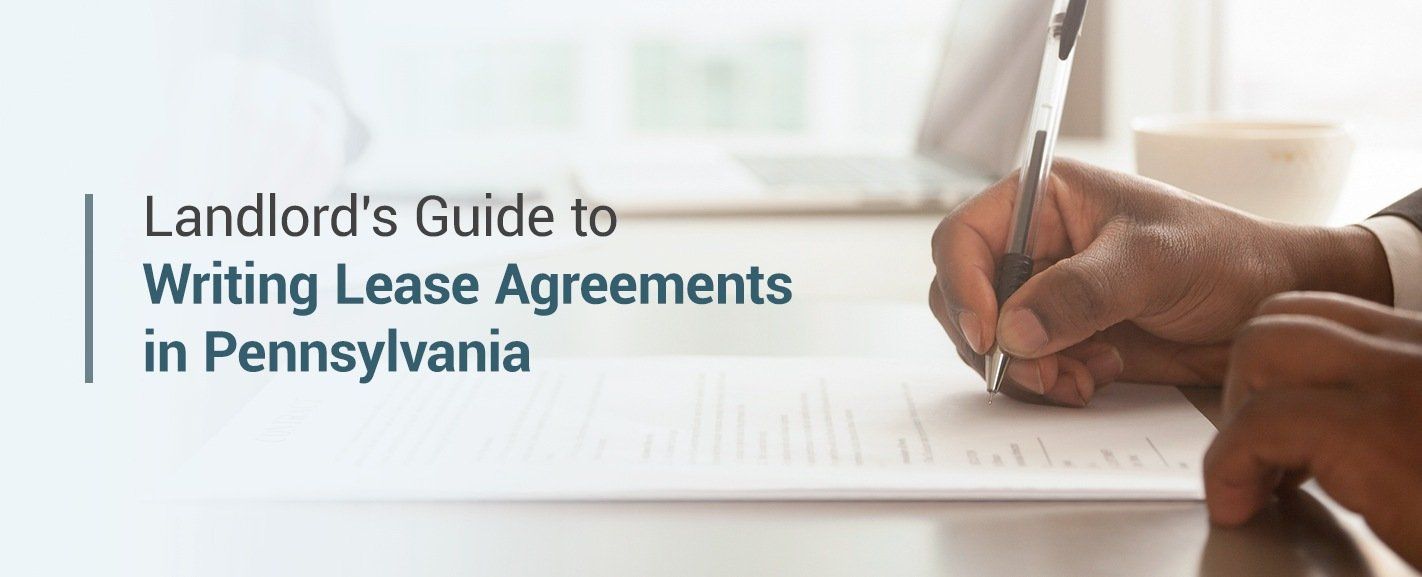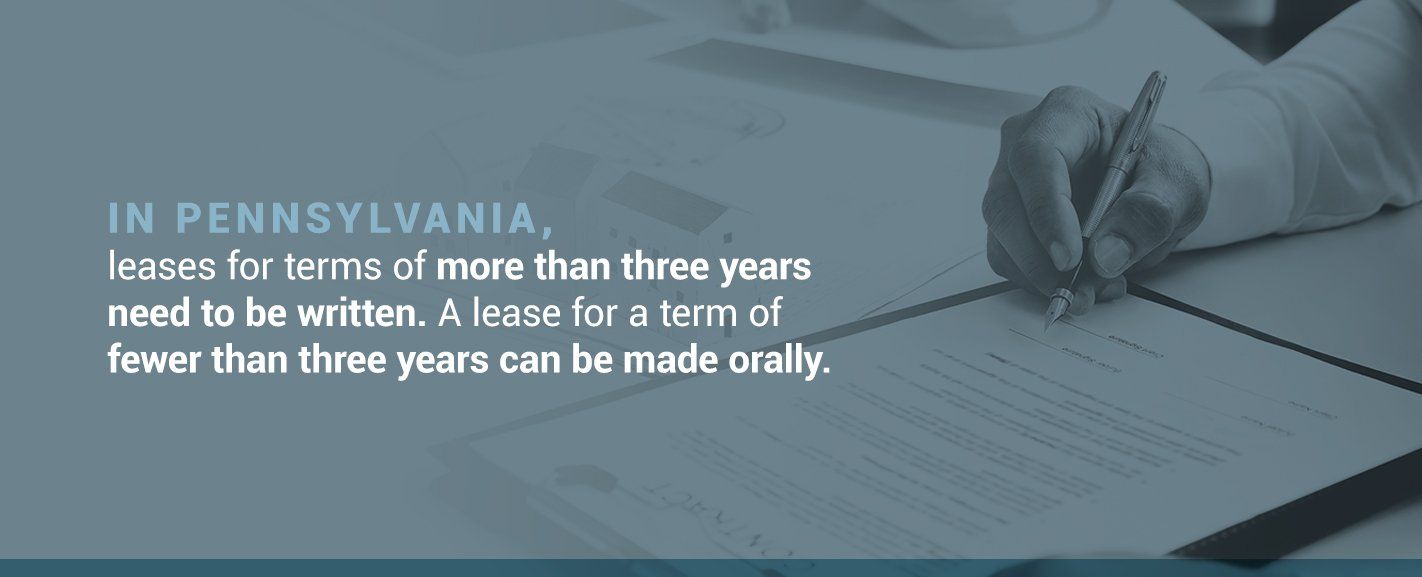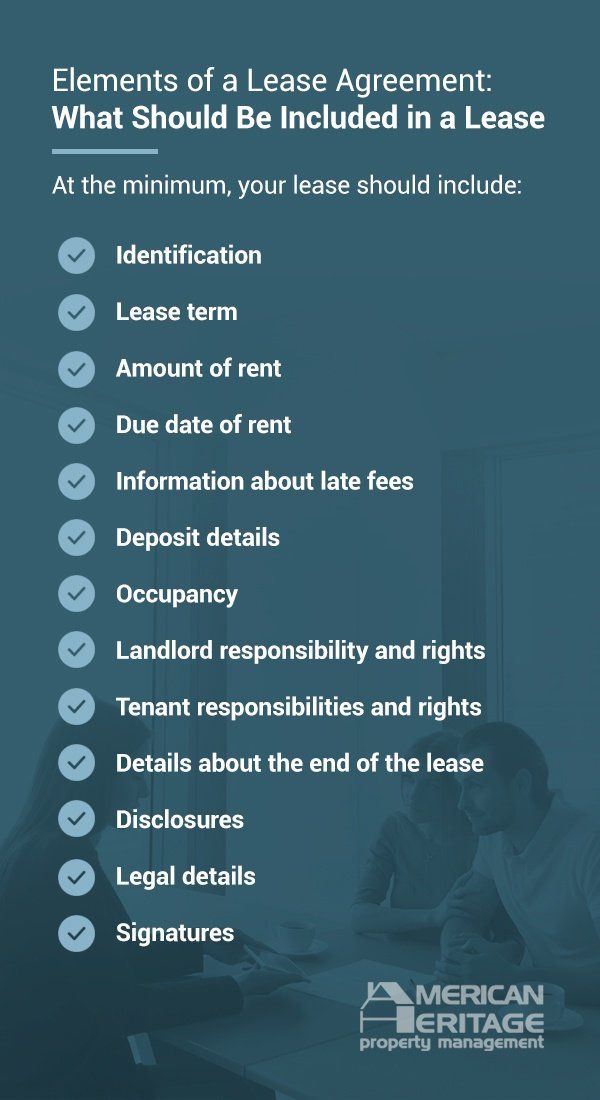Landlord's Guide to Writing Lease Agreements in PA
Your property is all ready to be rented out, and you've found a tenant who seems like a reliable renter after tenant screening. The next step is to have them sign a lease agreement, put down their security deposit and first month's rent and move in.
Before your new tenant can sign, though, you need to learn how to make a lease. Think of a lease as a way to protect yourself and your rental property in case something goes wrong. A lease can also protect the tenant, as it spells out their rights and what is expected of each party.
Lease laws can differ from state to state. If your property is located in Pennsylvania, here's what you need to know to put together a lease that is in alignment with the PA rental lease agreement laws.
What is a Written Lease?
A lease is a contract between two parties that defines the conditions and terms under which a tenant will inhabit a property owned by a landlord. A lease can be a written or oral agreement. In Pennsylvania, leases for terms of more than three years need to be written. A lease for a term of fewer than three years can be made orally.
Although you're within your rights as a landlord to create an oral lease with a tenant who plans to rent from you for a year, it is usually in your best interest and in the interests of your tenants to use a written lease. With a written lease, there is concrete documentation of the terms you and the tenant have agreed to. If any questions come up, either you or the tenant can refer to the written lease to find the answer.
Leases are sometimes confused with rental agreements, but the two aren't exactly the same. Usually, a rental agreement is a short form contract. It might last for just a month, or in some cases, for an even shorter period. At the end of the rental period, a tenant and landlord can decide to renew it. The tenant can also decide to move, or the landlord can decide to make changes to the contract, such as increasing the rent. Rental agreements offer flexibility but aren't always the right choice for a tenant or landlord.
The term of a lease is generally longer, usually for at least six months and often for at least a year. One of the benefits of a written lease is that it provides you with some reassurance that your property will be occupied and rent will be paid for a specified amount of time.
Length of the agreement aside, rental agreements and leases usually contain similar information, including the amount of the rent, when it is due and who is responsible for utilities.
What Are the Different Types of Lease Agreements in Pennsylvania?
The state of Pennsylvania allows landlords to offer three different lease agreements:
Residential Lease Agreements
Residential lease agreements have a specific start and end date, and the tenant pays monthly rent. A residential lease agreement will continue until either party gives a termination notice at least 30 days before the lease ends.
Commercial Lease Agreements
A commercial lease agreement is a contract between a landlord and a business tenant to rent a commercial property. They can include options like a gross lease, net lease and percentage lease, which enables businesses to find a rental option that meets their needs.
Month-to-Month Lease Agreements
Month-to-month lease agreements are typically for residential properties and tenants who need to relocate quickly or are unsure of their long-term plans. With a month-to-month lease agreement, landlords can easily adjust the rental price to meet current market conditions.
How to Write a Rental Agreement or Lease Agreement
You can easily find a lease agreement template online to use with your tenants, but it's not always best to do so. The template might not include everything you want, or it might not be in line with Pennsylvania's rental rules.
Writing your own lease is usually the way to go, though you can also hire a property management company to take care of lease preparation to take some responsibilities off your shoulders.
Elements of a Lease Agreement: What Should Be Included in a Lease
In general, the more detail and information you include in your lease, the better the lease can serve you and the tenant. You want to minimize the chance of there being any confusion or disagreement later on. At the minimum, your lease should include:
- Identification: The identification section is usually the first part of the lease and should state who the agreement is between — including the names of the tenants and landlord and the date of the agreement. It should also identify the property that is going to be rented out and its address.
- Lease term: The lease term is how long the lease will last, such as 12 months. The lease should specify the exact start and end dates of the agreement as well as any options for renewal. For example, some leases switch to a month-to-month agreement after the initial term is up.
- Amount of rent: It's important to state how much rent is each month.
- Due date of rent: The lease should also specify when rent is due, such as the first day of each month.
- Information about late fees: Pennsylvania doesn't have specific rules about late fees, and many landlords do charge a fee if a tenant pays late. Although you aren't required to, you might offer a grace period, such as three to five days, after which a late fee applies.
- Deposit details: In Pennsylvania, you are allowed to collect a security deposit from a tenant of up to two months of rent during the first year or one month's worth of rent in subsequent years. If you are going to collect security deposit funds, you should list the amount and include details about the deposit. What will the tenant need to do to get it back at the end of the lease? What factors can reduce the amount of deposit that you return?
- Occupancy: The lease should include information on subletting and occupancy in the property while a tenant lives there. For example, only the person named on the lease might be allowed to live there. Or, the tenant might be allowed to have roommates or family members who aren't on the lease live there, too. You can also include details about overnight guests in this section.
- Landlord responsibility and rights: The list of your responsibilities and rights should include details such as when you can enter the property, how tenants can get in touch with you if they need something repaired and the timeline for repairs. It should also state that you have the responsibility of maintaining the property in a livable condition.
- Tenant responsibilities and rights: The list of tenant's rights and responsibilities should detail what they are allowed to do while living at the property, what is expected of them and what they are entitled to. It can list the utilities the tenant is responsible for paying and what can happen if they do not pay.
- Details about the end of the lease: The lease should include a section that explains the process for terminating the lease. It should detail how much notice is required and what might happen if a tenant or landlord needs to end the lease early.
- Disclosures: Depending on the property, you might need to provide the tenant with information about mold or lead-based paint. The landlord disclosures section of the lease states that you did so.
- Legal details: The lease should include a section that states that it was made in accordance with Pennsylvania's governing law. If any part of the lease contradicts the law, the law will replace that part without nullifying the entire agreement.
- Signatures: Include a place for the landlord and tenants to sign the lease.
How to Write a Lease Agreement: Landlord-Tenant Agreement Form and Format
When preparing a lease in Pennsylvania, it helps to focus on making it easy to read and comprehend. You can do that through the word choices you make and in the way you format the lease. To make it skimmable, create section headings for part of the lease and break up the sections into paragraphs. Some steps to follow when creating a Pennsylvania lease agreement include:
1. Use a Template
You can use a lease agreement template from legal websites or state-specific resources to build your document. Once you find a template that works for you, customize and review it to ensure it includes all necessary clauses and agreements.
2. Consult a Lawyer
Taking the time to research and consult with a lawyer who specializes in writing lease agreements can prevent future issues with tenants.
Once you schedule a meeting with a lawyer to discuss your lease agreement, prepare all necessary documents and details. You can also use your consultation to ask any questions regarding legal terms or if you need clarification on any clauses and obligations. Once you answer any questions or make any necessary adjustments, you can have your lawyer review your agreement to verify that it is legally compliant and best protects your interests.
3. Include All Necessary Information
Before you present your lease agreement for the tenant to sign, ensure you have all relevant details about the tenant and the property ready. This information can include the lease term, lease renewal options, and the due date for rent. Check that fees, like the security deposit and utilities, are clear in the outline.
Additionally, if you have specific policies such as maintenance, pet restrictions and eviction protocols, you will want them to be clearly written in the lease. Ensure the lease includes legal requirements like fair housing laws and any disclosures about lead paint hazards.
How a Lease Can Protect a Landlord
While Pennsylvania law only requires written leases for rentals of more than three years, a written lease can protect you from legal issues and concerns in a few ways:
- Demonstrating legal knowledge: A written lease tells the tenant that you understand and take seriously their rights under Pennsylvania state law. When you include details about the security deposit, lead paint and occupancy rules in the lease, you demonstrate that you understand the law. Having a written lease that clearly lists tenant rights under the law helps ensure both parties are on the same page, avoiding potential communication breakdowns later on.
- Establishing financial protection: A written lease also gives you a measure of financial protection. If you decide to charge late fees, the lease should list the amount of the penalty and when it applies. If a tenant is late on a payment and refuses to pay the fee, you can always refer back to the lease.
- Accounting for different situations: With a written lease, you can plan for the scenarios a tenant might throw at you. For example, you might not want to allow pets on the property, as they can cause damage and can be difficult to clean up after. Even if the tenant doesn't have a pet on the day they move into the property, it is still a good idea to include a clause in the lease that states "no pets." That way, they will know that getting a dog or cat in the future isn't an option, at least for as long as they are living at your property.
- Requiring renter's insurance: You can also include a clause in the lease that requires a tenant to have renter's insurance. Requiring renter's insurance and making that requirement clear in the lease may protect you from being liable if there is an accident or other issue with the tenant's property.
If you have never prepared a lease before and are doing it on your own, it can be a good idea to work with an attorney who specializes in residential real estate and understands landlord-tenant laws. Your attorney can explain what can and should go into the lease and what shouldn't. They'll help you produce a contract that protects your interests while following Pennsylvania law. A property management company can also work with you to help you put together a contract that meets all the requirements for a valid lease.
How to Give a Lease to a Prospective Tenant
Who should sign the lease first: the landlord or the tenant? It's usually best to have the tenant sign first for a few reasons. The first is that there is a chance that a tenant might be slow to reply after getting a copy of the lease. If they are unresponsive, and you haven't signed the lease, you can move on to another prospective tenant. You can have the prospect sign a lease and pay their deposit, then finalize the contract by signing it yourself. But if you send a tenant a lease that's already signed, you run the risk of renting out the property twice if the first tenant takes their time replying.
Another reason to have the tenant sign first is that doing so lets you review any changes they make to the lease before it becomes final. A tenant might cross out a clause or change the late payment amount. If you have yet to sign the lease, you can stop the process and talk to the tenant about the changes they made before it is finalized. If you've already signed, the tenant could claim that you sent the lease to them with the clauses crossed out.
You have a few options for delivering the lease to a tenant. You can have them come to your office to sign a paper copy, or you can mail or hand-deliver a paper copy to them. You can also put the lease online and have them sign digitally.
What to Do After the Lease Is Signed
After the landlord and tenant have signed the lease, everyone should get a copy of it for their records. If the lease term hasn't started yet, the tenant will need to wait to get the keys and begin moving in. Before they get the keys, they will need to pay their first month's rent. It can be a good idea to walk through the property with the tenant before you give them keys, making note of any issues. Taking pictures before the person moves in can help you document any property damage that occurs while the tenant is living there.
Once the lease is signed, it's binding. The tenant needs to follow the rules outlined in the lease and you need to make sure you're providing them with a habitable place to live.
Professional Property Management Can Help You Make a Lease
When you create a lease agreement, it's important that it abides by Pennsylvania state law and respects the rights of your tenants.
If you've never written a lease before, American Heritage Property Management is here to help. We offer property management services in Pennsylvania and Maryland and have been doing so for nearly 40 years.









